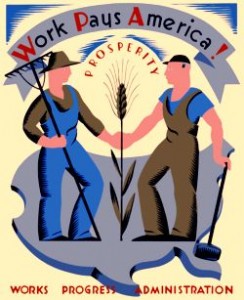Tom McNamara, Blueprint America
As Americans have slashed consumer spending, congressional Democrats want to buy American with stimulus spending.
The gross domestic product (GDP), the indicator of the country’s output, fell at a 3.8 percent annual rate in the fourth quarter of this past year, adjusted for inflation, from the previous quarter. Still, that number is not entirely accurate as the U.S. counts unwanted buildup of goods on store shelves as growth. Excluding the inventory adjustment then, GDP fell at a 5.1 percent annual rate.
Private sector jobs also declined 522,000 in the U.S. in January, according to Automatic Data Processing Inc. and consultancy Macroeconomic Advisers. The Bureau of Labor Statistics reported 524,000 nonfarm jobs were lost in December and a Dow Jones Newswires survey predicts a loss of 525,000 for January, when the bureau reports at the end of this week.
Already, on Jan. 28, the House approved its version of the stimulus package, estimated to cost $819 billion. The Senate is set to vote soon on its version, which carries a price tag nearing $900 billion. Eventually, Democrats hope to pass the bill by mid-February – sometime within the next two weeks.
The House version contains a provision that would mostly keep foreign steel and iron from being used in infrastructure projects funded by the stimulus package. The Senate version goes even further, requiring, with some exceptions, that all stimulus-funded projects use only American-made equipment and goods.
The consequence of this kind of legislation, however, would be a protectionist society. Reuters reports, “The governments of both the European Union and Canada sent letters to Congress on Monday urging the provision be dropped.”
In response, the Peterson Institute for International Economics published, “Buy American: Bad for Jobs, Worse for Reputation.”
“Buy American” provisions, according to The Peterson Institute for International Economics, could create only 1,000 new steel industry jobs and might cost as many as 65,000 across a number of associated sectors.
In contrast, Reuters also reports, “A study done earlier this year for the Alliance for American Manufacturing, whose members include the United Steelworkers union, U.S. Steel and other metal manufacturers such as Allegheny Technologies, estimated that requiring 100 percent U.S. content in infrastructure projects would create 77,000 new jobs.”
President Barack Obama, at the same time, is backing away. In an interview with ABC, he said, “I think we need to make sure that any provisions that are in there are not going to trigger a trade war.”
Douglas A. Irwin, professor of economics at Dartmouth and author of “Free Trade Under Fire,” recently wrote in The New York Times in response to the “Buy American” provisions, “When the United States imposed the Smoot-Hawley Tariff in 1930, it helped set off a worldwide movement toward higher tariffs. When everyone tried to restrict imports, the combined effect was a deeper global economic slump. It took decades to undo the accumulated trade restrictions of that period. Let’s not make the same mistake again.”



